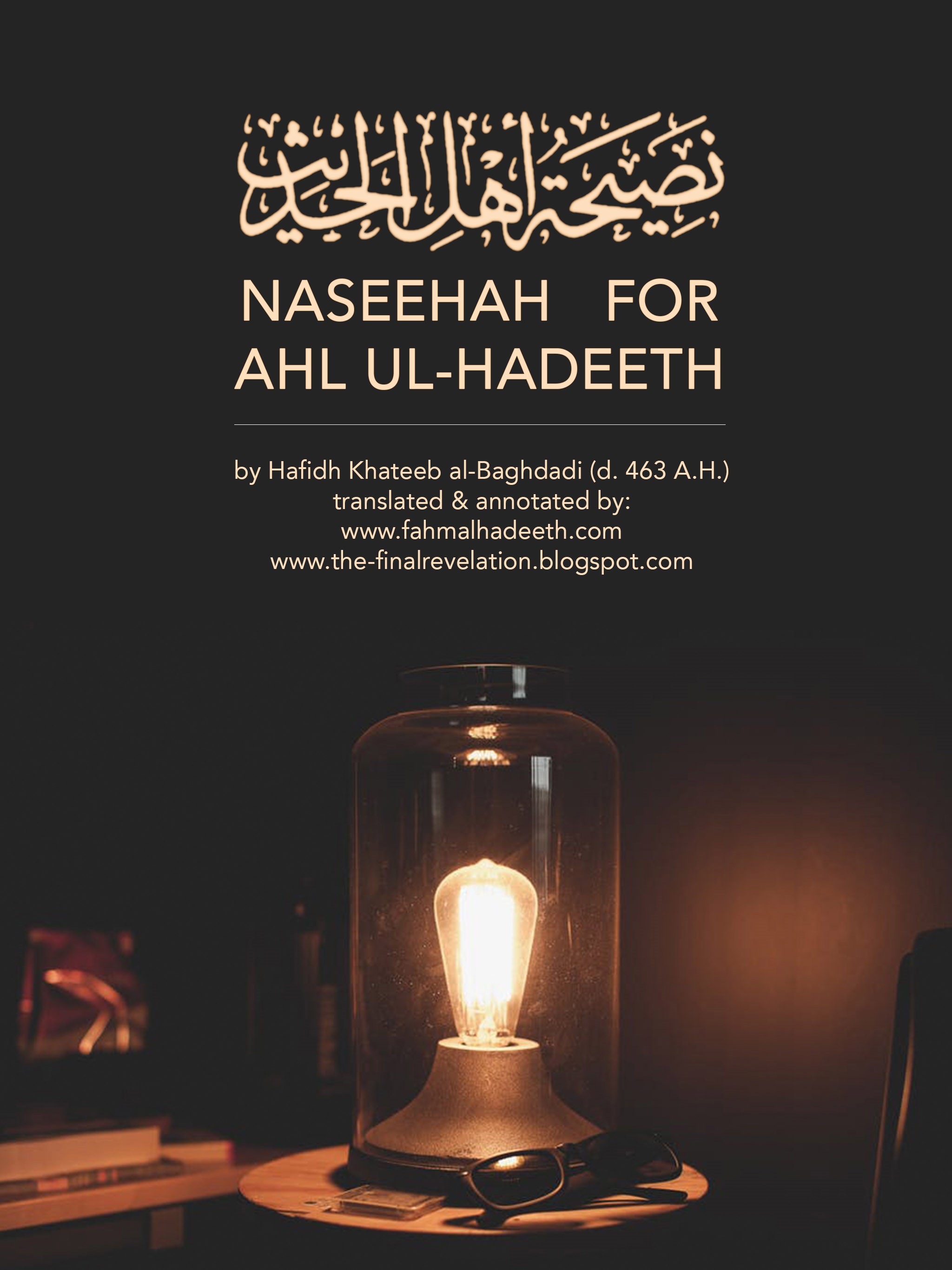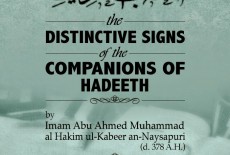Translation – Naseeha Ahlul Hadeeth by Khateeb al-Baghdadi (D. 463 A.H)
Translator’s Note:
The purpose of translating this work of Imam Khateeb al-Baghdadi (392 AH-463 AH) – who needs no introduction – is to add yet another effort to an existing chain of articles that have been penned down previously combatting the disease of self-interpretation namely:
- The Obligation And Importance Of Seeking Knowledge From The Scholars : https://the-finalrevelation.blogspot.com/2013/06/the-obligation-and-importance-of.html
- Warning From Self Interpretation Of Quran And Hadeeth : https://the-finalrevelation.blogspot.com/2014/02/warning-from-self-interpretation-of.html
- The Obligation Of Seeking Knowledge Via The Understanding Of The Salafus Saliheen : https://fahmalhadeeth.com/the-obligation-of-seeking-knowledge-via-the-understanding-of-the-salafus-saliheen/
- Defending The Muhadditheen From Forging Self Concocted Principles: https://fahmalhadeeth.com/defending-the-muhadditheen-from-forging-self-concocted-principles-a-reply-to-the-fans-of-mawdudi-and-ilk/
- The Authority Of Scholars In Deciding What Is Halal And What Is Haram: https://fahmalhadeeth.com/the-authority-of-scholars-in-deciding-what-is-halal-and-what-is-haram/
- Zawabit Al-Jarh Wa Tadeel By Irshad Ul Haq Athari Part 1: https://fahmalhadeeth.com/zawabit-al-jarh-wa-tadeel-by-irshad-ul-haq-athari-part-1/
- Zawabit Al-Jarh Wa Tadeel By Irshad Ul Haq Athari Part 2: https://fahmalhadeeth.com/zawabit-al-jarh-wa-tadeel-by-irshad-ul-haq-athari-part-2/
Often, many lay youth who via their informal study approach, claim to be students of knowledge, tend to overestimate themselves to a level where they start debunking actual scholarship and possibly everything that is dependent on it. Indulging in self-interpretation, not considering the need of tutorship for Islamic studies, disassociating with the notion of sticking to the understanding of the pious predecessor (salafus saaliheen) and eventually displaying behavioural traits as if it were a sign-board shouting ‘I am a Mujtahid’ Is not the least of it.
Subsequently having witnessed all of this first hand along with a worrisome list of colleagues and friends complaining over the same in and around their city, It was, by the will of Allah, decided to translate the work of Imam al-Haafidh `Ali Khateeb al-Baghdadi (r.h) translated “ Sincere council for the Ahl ul-Hadeeth”.
The Imam has brought a series of precise narrations dealing with the importance of both tutorship as well as the need to understand fiqh and not merely choke down ahadeeth, as is the norm these days!
Some important parameters that were adhered to while translating are as follows:
Omission of Irrelevant passages: Lengthy asaneed (chains of narrations) in the Arabic passages have not been translated into English because any student who wants to study the chain obviously is expected to have the necessary pre-requisite of not depending on the English translation for its analysis. Therefore for the regular readers, the main focus is the matan (content) part and not the debates over the chain in the book.
Contextualize based translation: It is quite a task to translate the ever rich and comprehensive language of Arabic especially when it relates to a particular topic. Therefore much care has been taken so as to not drift away too much from both the literal as well as their respective context. In case of conflict, preference is given to conveying the message of the narrator.
Terminologies: It is not feasible to translate many Arabic usooli words therefore certain Arabic istilaha have been left as it is
Footnotes: As the reader will notice, footnotes are substantially provided consisting of information that the translator deems crucial to the post and/or related to its content such as short biographies of certain Imams, tawtheeq (or accreditation) of some narrators. Frequently corroborating narrations from the Prophet and his companions accompanied by the fatawa of other giant scholars are also provided so as to help the reader understand the underlying message better by correlating the incident in hand with other similar events elsewhere
This translation is based on the print published by Dar al-Asala , Khartoum ( دار الأصالة – الخرطوم ) in 1988 in Volume 1, Edition 1
Kindly contact us for any corrections, feedback or clarifications on www.facebook.com/thefinalrevelation or via one of the websites mentioned above.
كان عمر رضي الله عنه يقول : رحم الله امرأ أهدى إلي عيوبي
May Allah have mercy on the man who shows me my faults
[Ref: A statement attributed to `Umar radhiallahu anhu in Sunan ad-Darimee 1/506 or 1/166 or # 675 with a weak chain and Ahmad Shaakir (ed.), ar-Risalah of ash-Shaf`ee, P: 73 footnote no. 8 See Dr. Muhammad Adhmi’s book titled “ The history of the quranic text page 20 “]
Translation & Annotation completed on: Saturday, 12th of August, 2017
By: www.fahmalhadeeth.com | www.the-finalrevelation.blogspot.com
Download: http://www.mediafire.com/file/1anbrbohdrefbf8/Naseeha+Ahlul+Hadeeth+by+Khateeb+Baghdadi.pdf
Mediafire link from mobile works only when you open the link using the default inbuilt browser (not chrome/firefox for some phones it works in chrome browser and nothing else. SO TRY DIFF BROWSERS). Or copy the link url and paste it in your laptop’s browser
Alternate download link: https://app.box.com/s/6fifxlx9brwes08t5ag2rpjqrhav6tfj
Below passages are translated into english for the readers to get an idea of how the scholars were pointing out some great names of muhadditheen who mastered the memorisation of hadeeth yet were not masters of jurisprudence and could not fluently give fatawa for various mas’ail that arouse day to day in the lives of people.
Imam ibn Jawzi (r.h) said
Generations have exhausted their years memorising the routes of ahadeeth and by my life this action is praiseworthy except in the case when preference is given to something more important than this. So we see that many of those who memorise ahadeeth lack the know-how of understanding (fiqh) that is more important than memorisation. When a student of hadeeth focuses more on hearing and writing (down what he hears from the routes of ahadeeth) then the (golden) time for memorisation will pass by. So when he ages in years he won’t be able to memorise matters of more importance (with fluency). So if you intend to grasp the stature of understanding then study ‘ martaba’ of asma`i (مرتبة الأصمعي) and Martaba of sibawy in fiqh.
So if an inquiry reaches a place where there be a senior shaykh who has various asaneed but lacks expertise in matters of fiqh and amidst them is a young man who has the requisite skills of jurisprudence – then the shaykh should remain quiet and the young faqeeh should respond. And this is sufficient in the virtue of fiqh.
And many people indulged in uloom al-hadeeth but abstained from delving into the sciences of fiqh so when in the subject of ahkaam a questioned was posed to them, they were embarrassed.
Imam ibn jawzi (r.h) then via his chain that reaches Yahya ibn sa`eed, narrated that: A woman came to Yahya ibn sa`eed and asked:
Oh shaykh, what do you say about a well in which a hen fell and died , is the water (of the well) pure or not?
Yahya (rahimahullah) replied: Woe to you! How can a hen fall in the well?!
Woman: The (top of the) well was not covered
Yahya replied: Could you not have covered the well to prevent something from falling into it?!
Woman said: it was not covered
Yahya (probably could not answer and) insisted: Could you not have covered the well?!
Abhuri said: Oh Woman, if the (state of the) water [1] has transformed then it is impure otherwise it remains pure.
Ibrahim al-Harbi (r.h) said: It reached me that a woman came to (Imam)`Ali ibn dawood was narrating ahadeeth affront thousands of students/people.
So the woman questioned: What is the amount of charity for my skirt/lower dress or i want to donate the price of my lower skirt
He asked: How much did you buy it for?
She replied: 22 dirhams.
Later, when the woman left `Ali ibn dawood (r.h) exclaimed (in sorrow): Oh! Oh! I answered her by imposing the kaffarah amount that is paid in the case of zihar [2]
Imam ibn jawzi then said:
If the years of one’s life were vastly expansive then i would have instructed you to acquire the skills of all types of knowledge (but this is not the case for humans) But when the age is restricted then priority should be given that (study subject) which is important and virtuous.
[Ref: the virtue of memorising knowledge, page 39]
[1] colour, smell or taste
[2] http://www.islamweb.net/emainpage/index.php?page=showfatwa&Option=FatwaId&Id=85470
Narration no. 17 in the book is weak. See the screenshot below that mentions the tahkeeq of Dr. Muhammad `ajjaaj khateeb in his ta`leeq in the book of muhaddith ramahurmuzi in muhaddith al-faasil (page 249)
The dr. also says that imams like Abu thawr – who was asked such questions (as comes under no. 17) then it must be that imam abu thawr must be a young man then during his early days when the woman asked him this question because abu thawr was one of the companions of shaf`i. Also the level of giants like ibn ma`een , ibn khaithama and other figures mentioned in these narrations were well known to be on a high level of fiqh. So these incidents ought to be from their very early days when they were teenagers or so.











